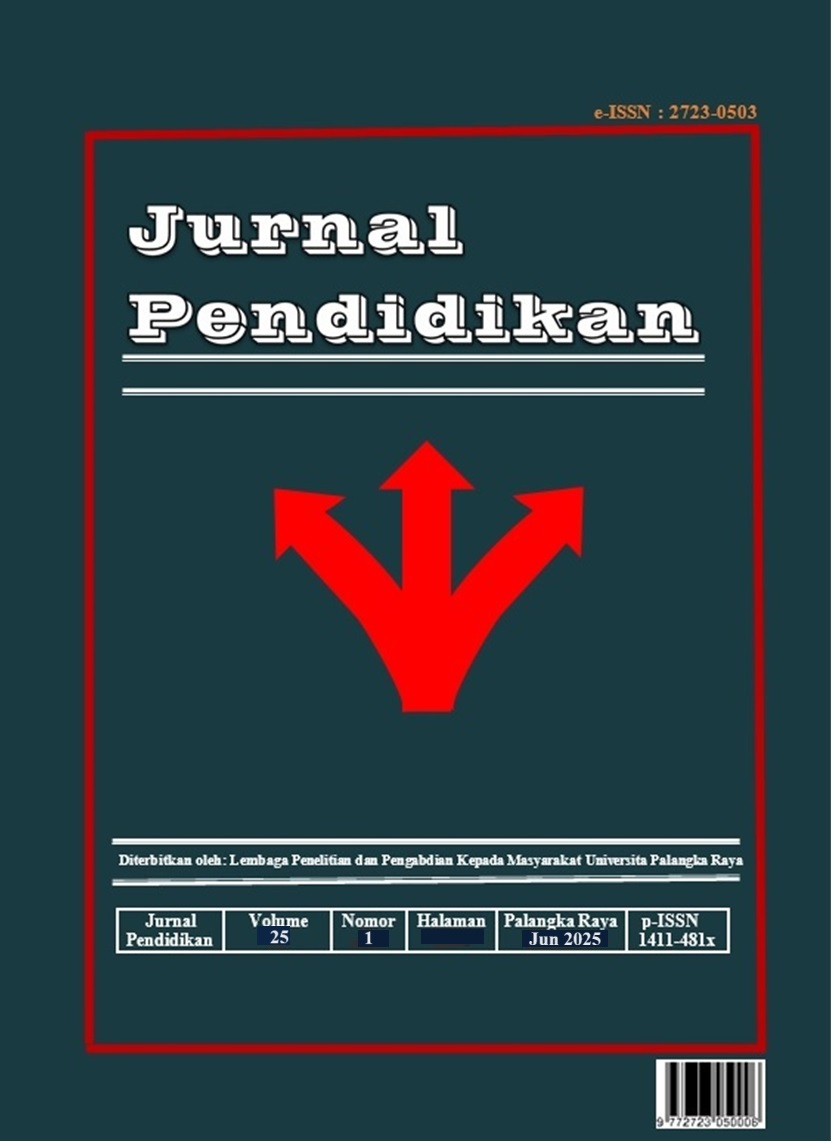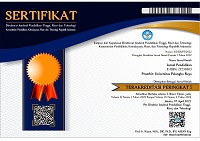The Relationship Between Self-Efficacy and Peer Association with Mathematics Learning Outcomes of Grade X Students of SMAN 4 Palangka Raya
DOI:
https://doi.org/10.52850/jpn.v25i1.13316Keywords:
self-efficacy, peer association, math learning outcomesAbstract
This study aims to find out: (1) The relationship between self-efficacy and mathematics learning outcomes of grade X students of SMAN 4 Palangka Raya, (2) The relationship of peer association with mathematics learning outcomes of grade X students of SMAN 4 Palangka Raya, (3) The relationship of self-efficacy and peer association with the mathematics learning outcomes of grade X students of SMAN 4 Palangka Raya. This research was carried out in the even semester of the 2023/2024 academic year. The study population was 515 students with a sample of 221 students. Based on the results of the trial, the self-efficacy questionnaire obtained 36 valid statements with , the peer association questionnaire obtained 28 valid statements with , and the mathematics learning outcomes test obtained 21 valid questions with . Based on the results of the prerequisite analysis test, namely the normality test, obtained for self-efficacy data , peer association data , and mathematics learning outcome test data , while the value , because the three data are not normally distributed, so the test used is nonparametric statistical analysis, namely Spearman rank correlation. The results of this study can be concluded: (1) There is a positive relationship between self-efficacy and mathematics learning outcomes of grade X students of SMAN 4 Palangka Raya; (2) There is a positive relationship between peer association and mathematics learning outcomes of grade X students of SMAN 4 Palangka Raya; (3) There is a positive relationship between self-efficacy and peer association with mathematics learning outcomes of grade X students of SMAN 4 Palangka Raya
Downloads
References
Djamaluddin, A., & Wardana. (2019). Belajar Dan Pembelajaran. In CV Kaaffah Learning Center. Hamalik, O. (2007). Proses Belajar Mengajar. Jakarta: Bumi Aksara.
Hurlock, E. B. (1997). Perkembangan Anak. Jakarta: PT. Gelora Aksara Pratama.
Idi, A. (2011). Sosiologi Pendidikan Individu, Masyarakat dan Pendidikan. Jakarta: PT Raja Grafindo Persada.
Jendra, A. F., & Sugiyo, S. (2020). Pengaruh Efikasi Diri Terhadap Kecemasan Presentasi Siswa Kelas XI di SMA Negeri 1 Wuryantoro. KONSELING EDUKASI “Journal of Guidance and Counseling,” 4(1), 138–159. https://doi.org/10.21043/konseling.v4i1.5992
Komarudin & Sarkadi. (2017). Evaluasi Pembelajaran. Jakarta: Laboratorium Sosial Politik Press Program Studi Pendidikan Pancasila dan Kewarganegaraan Jurusan Ilmu Sosial Politik Fakultas Ilmu Sosial Politik Universitas Negeri Jakarta.
Ma'ruf, A. H. (2018). Perbedaan Hasil Belajar Matematika Siswa dengan Metode Problem Posing dan Metode Ekspositori SMA N 58 Jakarta. Jurnal Ilmu Pendidikan (JIP) STKIP Kusuma Negara, 10(1), 51-60.
Mairing, J. P. (2017). Statistika Pendidikan Konep & Penerapannya Menggunakan Minitab dan Microsoft Excel. Yogyakarta: ANDI.
Nuryanti, L. (2008). Psikologi Anak. Jakarta: Indeks.
Pratiwi, W. (2010). Pengaruh Pergaulan Teman Sebaya terhadap Minat Belajar PKn Siswa Kelas V SD Wonosari VI. Skripsi. FIP-UNY.
Rahmawati, E. D. (2015). Pengaruh Pergaulan Teman Sebaya Dan Konsep Diri Terhadap Kecerdasan Emosional Siswa Kelas V SD Negeri Se-Kecamatan Tegalrejo Yogyakarta Tahun Ajaran 2014/2015. Skripsi. FIP UNY.
Revita, N. (2019). Hubungan Self Efficacy (Efikasi Diri) terhadap Hasil Belajar Ipa Siswa Kelas VII SMPN 1 Tanah Putih Tahun Ajaran 2019/2020.
Rukayah, R., Marliana, M., & Rahman, S. A. (2022). Hubungan Pergaulan Teman Sebaya dengan Prestasi Belajar Siswa Kelas IV SD. JPPSD: Jurnal Pendidikan Dan Pembelajaran Sekolah Dasar, 2(1), 19. https://doi.org/10.26858/pjppsd.v2i1.27084
Santrock, John W. (2011). Children. Terjemahan Masa Perkembangan Anak, edisi II buku 2 (Alih bahasa: Verawaty Pakpahan dan Wahyu Anugraheni. Jakarta: Salemba Humanika
Sugiyono. (2013). Metode Penelitian Kuantitatif Kualitatif dan R&D. Bandung: Alfabeta.
Suryani, L., Seto, S. B., & Bantas, M. G. D. (2020). Hubungan Efikasi Diri dan Motivasi Belajar Terhadap Hasil Belajar Berbasis E-Learning pada Mahasiswa Program Studi Pendidikan Matematika Universitas Flores. Jurnal Kependidikan: Jurnal Hasil Penelitian Dan Kajian Kepustakaan Di Bidang Pendidikan, Pengajaran Dan Pembelajaran, 6(2), 275. https://doi.org/10.33394/jk.v6i2.2609
Wahyuningsih, Y. (2019). Hubungan Antara Pergaulan Teman Sebaya Dengan Hasil Belajar Siswa Kelas Iv Mi an-Nur Guppi Mojopahit Kecamatan Punggur Kabupaten Lampung Tengah. 1–137.
Widianawati, A. (2017). Hubungan Self Efficacy, Kemandirian Belajar, dan Kecerdasan Emosional Terhadap Prestasi Belajar Matematika Pada Siswa Kelas VIII SMP Negeri di Kecamatan Klirong Tahun Pelajaran 2016/2017. i–115. http://202.91.10.51:8080/xmlui/bitstream/handle/123456789/1889/132140158-Anisa Widianawati-ilovepdf-compressed.pdf?sequence=1&isAllowed=y
Zimmerman, B. J. (2010). Self-efficacy and educational development. In Self-Efficacy in Changing Societies (Issue December). https://doi.org/10.1017/cbo9780511527692.009
Downloads
Published
How to Cite
Issue
Section
License
Copyright (c) 2024 Desti Haryani, Pancarita ., Rindan Hasanah

This work is licensed under a Creative Commons Attribution-NonCommercial-NoDerivatives 4.0 International License.















